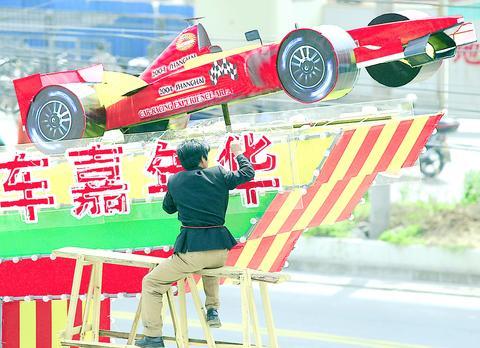Chinese Premier Wen Jiabao (溫家寶) said on Wednesday that China was committed to forceful measures to cool its dangerously fast-growing economy, which has benefited global growth but which, left unchecked, has the potential to drag it down.
Wen, on the eve of a 10-day tour that includes stops in Germany, Belgium, Italy, Ireland and Britain, also said he hoped to build on a partnership with the EU -- his first visit to the continent since he was named premier in March last year.

PHOTO: AFP
China reported 9.7-percent growth in the first quarter of this year but faces resurgent inflation due to unchecked expansion in money supply, bank credit and fixed asset investment.
Counting out a series of problems on his fingers, Wen underscored the weaknesses underlying one of the world's fastest growing economies, problems which he said would prevent all but the most prudent steps in reforming the tightly held yuan currency.
"We need to take effective and very forceful measures to resolve those problems as soon as pos-sible," Wen said.
Beijing has restricted bank lending, singled out cement, steel and aluminum projects in a broad clampdown to stamp out excess development and, just on Wednesday, issued new land-use rules to rein in industrial growth.
"We believe that all those measures are going to take off in future, and we hope not to see any major ups and downs in our economic development," he said.
Wen's comments helped push prices down in metal markets, as traders in both stock and futures markets worried any moves aimed at cooling China's economy could cut into strong demand for metals that have underpinned profits of many companies. The pressures would require China to tread softly in reforming the yuan, he said, and sudden changes would threaten global growth.
"If we change the system rashly, it will certainly bring unpredictable problems to the domestic economy, and at the same time could affect the financial stability of the region and even the world," Wen said.
Analysts have said China may move on the currency towards the end of this year, and officials have said they are studying the possibility of pegging it to a basket of currencies, a measure somewhere in between an outright revaluation and a modest widening of the tra-ding band.
Wen offered no preference for which path China might take, saying only that it would keep an open mind and was willing to give serious study to any proposal.
US metal stocks fell sharply on concerns that credit restrictions in China could dent the country's demand for raw materials. New York metal futures also tumbled. China has been sucking in raw materials to feed a construction boom and rising demand for consumer goods.
"That seems to be behind just about everything, the fact they are trying to curb credit," said James Pogoda, a vice president of precious metals at Mitsubishi International Corp in New York.
"Demand out of China, which has just been huge for the past year or more, could be slowed and could be hamstrung by some of these regulations or whatever is going to be announced," he said.

The Ministry of Foreign Affairs (MOFA) yesterday said it is closely monitoring developments in Venezuela, and would continue to cooperate with democratic allies and work together for regional and global security, stability, and prosperity. The remarks came after the US on Saturday launched a series of airstrikes in Venezuela and kidnapped Venezuelan President Nicolas Maduro, who was later flown to New York along with his wife. The pair face US charges related to drug trafficking and alleged cooperation with gangs designated as terrorist organizations. Maduro has denied the allegations. The ministry said that it is closely monitoring the political and economic situation

Conflict with Taiwan could leave China with “massive economic disruption, catastrophic military losses, significant social unrest, and devastating sanctions,” a US think tank said in a report released on Monday. The German Marshall Fund released a report titled If China Attacks Taiwan: The Consequences for China of “Minor Conflict” and “Major War” Scenarios. The report details the “massive” economic, military, social and international costs to China in the event of a minor conflict or major war with Taiwan, estimating that the Chinese People’s Liberation Army (PLA) could sustain losses of more than half of its active-duty ground forces, including 100,000 troops. Understanding Chinese

UNRELENTING: China attempted cyberattacks on Taiwan’s critical infrastructure 2.63 million times per day last year, up from 1.23 million in 2023, the NSB said China’s cyberarmy has long engaged in cyberattacks against Taiwan’s critical infrastructure, employing diverse and evolving tactics, the National Security Bureau (NSB) said yesterday, adding that cyberattacks on critical energy infrastructure last year increased 10-fold compared with the previous year. The NSB yesterday released a report titled Analysis on China’s Cyber Threats to Taiwan’s Critical Infrastructure in 2025, outlining the number of cyberattacks, major tactics and hacker groups. Taiwan’s national intelligence community identified a large number of cybersecurity incidents last year, the bureau said in a statement. China’s cyberarmy last year launched an average of 2.63 million intrusion attempts per day targeting Taiwan’s critical

‘SLICING METHOD’: In the event of a blockade, the China Coast Guard would intercept Taiwanese ships while its navy would seek to deter foreign intervention China’s military drills around Taiwan this week signaled potential strategies to cut the nation off from energy supplies and foreign military assistance, a US think tank report said. The Chinese People’s Liberation Army (PLA) conducted what it called “Justice Mission 2025” exercises from Monday to Tuesday in five maritime zones and airspace around Taiwan, calling them a warning to “Taiwanese independence” forces. In a report released on Wednesday, the Institute for the Study of War said the exercises effectively simulated blocking shipping routes to major port cities, including Kaohsiung, Keelung and Hualien. Taiwan would be highly vulnerable under such a blockade, because it